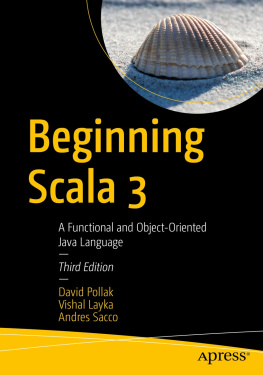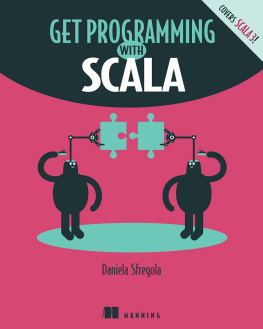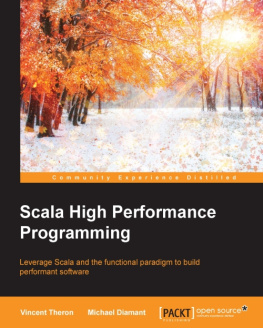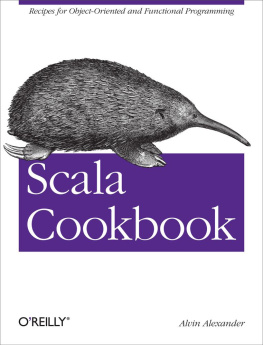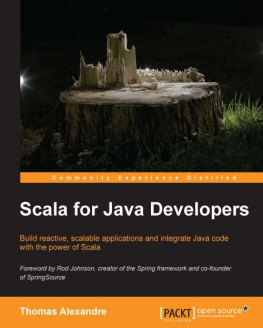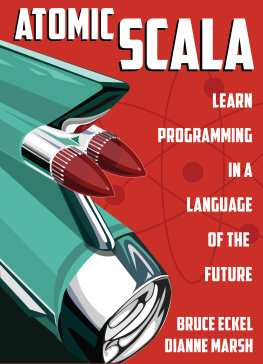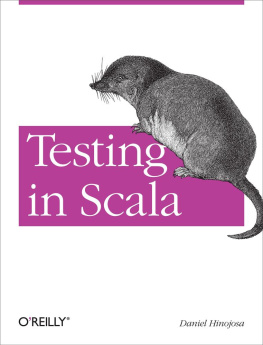Daniel Westheide - Scala from Scratch: Exploration
Here you can read online Daniel Westheide - Scala from Scratch: Exploration full text of the book (entire story) in english for free. Download pdf and epub, get meaning, cover and reviews about this ebook. year: 2019, publisher: leanpub.com, genre: Computer. Description of the work, (preface) as well as reviews are available. Best literature library LitArk.com created for fans of good reading and offers a wide selection of genres:
Romance novel
Science fiction
Adventure
Detective
Science
History
Home and family
Prose
Art
Politics
Computer
Non-fiction
Religion
Business
Children
Humor
Choose a favorite category and find really read worthwhile books. Enjoy immersion in the world of imagination, feel the emotions of the characters or learn something new for yourself, make an fascinating discovery.

- Book:Scala from Scratch: Exploration
- Author:
- Publisher:leanpub.com
- Genre:
- Year:2019
- Rating:3 / 5
- Favourites:Add to favourites
- Your mark:
- 60
- 1
- 2
- 3
- 4
- 5
Scala from Scratch: Exploration: summary, description and annotation
We offer to read an annotation, description, summary or preface (depends on what the author of the book "Scala from Scratch: Exploration" wrote himself). If you haven't found the necessary information about the book — write in the comments, we will try to find it.
Scala from Scratch: Exploration — read online for free the complete book (whole text) full work
Below is the text of the book, divided by pages. System saving the place of the last page read, allows you to conveniently read the book "Scala from Scratch: Exploration" online for free, without having to search again every time where you left off. Put a bookmark, and you can go to the page where you finished reading at any time.
Font size:
Interval:
Bookmark:

This book is for sale at http://leanpub.com/scala-from-scratch-exploration
This version was published on 2020-07-28
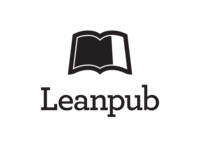
* * * * *
This is a Leanpub book. Leanpub empowers authors and publishers with the Lean Publishing process. Lean Publishing is the act of publishing an in-progress ebook using lightweight tools and many iterations to get reader feedback, pivot until you have the right book and build traction once you do.
* * * * *
All text and source code examples (unless specified otherwise) by Daniel Westheide
This book uses three fonts:
- The body font is Noto Serif (licensed under the SIL Open Font License v1.10, available at https://www.google.com/get/noto/#serif-lgc)
- The title font is Noto Sans (licensed under the SIL Open Font License v1.10, available at https://www.google.com/get/noto/#sans-lgc)
- The code font is Source Code Pro (licensed under the SIL Open Font License 1.1, available at https://github.com/adobe-fonts/source-code-pro)
Cover illustration by Ann-Marie Rechter (Illumarie Art)
Website: https://www.ann-marierechter.de
Twitter: https://twitter.com/illumarie
Instagram: https://instagram.com/Illumarie_Art
The font for the book title and author name on the cover is Alegreya Sans (licensed under the SIL Open Font License v1.10, available at https://fonts.adobe.com/fonts/alegreya-sans).
In the last few years, Scala and a bunch of technologies based on it have gained a lot of traction. Some of these technologies became crucial for dealing with big and fast data. Others paved the way when it comes to building resilient, scalable applications. As a consequence, Scala became very popular in startups living on the bleeding edge. In the wake of this, even big, conservative enterprises have been adopting it more and more.
Scala stands on the shoulders of the Java Virtual Machine (JVM). Developers can integrate with the vast pool of great libraries the Java ecosystem has to offer. Since shortly after its inception, it has been leading the way on the JVM when it comes to combining the object-oriented and functional programming paradigm. We have seen Java adopt functional language features that have proven to be a great success in Scala. Also, new languages like Kotlin emerged that take a lot of inspiration from Scala.
While Java and others have been following suit at their own pace, Scala continues to be the forerunner on the JVM. It provides one of the most sophisticated type systems in mainstream programming languages. As such, its a great tool for writing safe, concurrency-friendly code that is easy to test, in a succinct way.
Scala originated on the JVM, but these days its available for two alternative targets as well: Scala.js compiles to JavaScript, where as Scala Native allows you to write native applications, using LLVM.
This book is the first one in the Scala from Scratch series. It will give you a strong foundation and a comprehensive overview of what Scala brings to the table. The goal is to get you excited about the language and to give you an idea of what its like to work with Scala. By the end of the book, you should be able to write small Scala programs on your own. Well show how to do that by walking through a small, but complete example application.
If you are hungry for more, you can continue your journey in the second book, Scala from Scratch: Understanding. It will explain many of the concepts introduced in this book in more depth, and it will cover concepts and language features that are too advanced for an introductory book.
While Scala.js and Scala Native have gained a bit of traction, this book and the follow-up book focus solely on Scala for the JVM, which is where Scala is most popular.
This book is mainly targeted at people who are already somewhat familiar with an object-oriented and imperative language like Java, Ruby, or Python whether you are a student, a software engineer, or a data scientist.
You should know a thing or two about the tools in your languages ecosystem. Yet you dont have to be an experienced software engineer. Were using the command-line. Some basic familiarity with how to execute commands in your operating systems command-line interface would be nice.
Experience with some typical object-oriented design patterns is helpful, but not required.
You neednt know anything about functional programming before reading this book. All you need is an open mind and the willingness to leave your comfort zone and think outside the box.
I wrote this book as a text book. Its best to read it from the first to the last chapter. This is by no means a language reference. However, it should be easy for you to get back to any chapter or section in the future if you want to refresh your knowledge on a specific topic.
Youll get the most out of this book by trying out all the examples that I use to explain new concepts. Besides, many, but not all the sections in this book contain a few exercises that you can work on by yourself. If you do, youll get new insights about what you have learned. Nothing in the book requires for you to have tackled a previous exercise. Even so, its recommended to spend some time with these exercises before moving on to the next section.
This book makes use of the following typographical conventions:
- Italic text is used when introducing a new term, as well as for emphasis
Constant widthtext is used for program listings, for references to code elements, file and directory names, and for shell commands or program output- In program listings, a
$at the beginning of the line tells you that you are in a shell in your terminal, for example bash or zsh
If you spot any typos, factual errors, or other problems, please take the time to inform me about it. The best way to do that is the LeanPub feedback form.
If you like this book, I would be grateful if you could spread the word. Please tell your friends, share it on Twitter or other social media channels, or publish a review. A great place to do that is the books GoodReads page.
Daniel Westheide is a software engineer living in Berlin, Germany. He is a senior consultant at INNOQ and co-organiser of ScalaBridge Berlin, the Berlin chapter of the ScalaBridge organisation. He cares about empathy and inclusivity, and about the ethical, social, and ecological consequences of his work.
On his website, he discusses functional programming, architecture, as well as anything related to the software development process. He is not only interested in programming languages, but also a human language enthusiast. Moreover, he is passionate about specialty coffee, social science fiction, and tabletop roleplaying games.
Thanks a lot to Lars Hupel, Stefan Lauer, Timo Loist, Martin Otten, Lara Pourabdolrahim, Nicolas Rinaudo, Tina Schnborn, Jan Stpie and everyone I have forgotten for giving me valuable feedback, proofreading, and being my rubber duck when I needed one.
Font size:
Interval:
Bookmark:
Similar books «Scala from Scratch: Exploration»
Look at similar books to Scala from Scratch: Exploration. We have selected literature similar in name and meaning in the hope of providing readers with more options to find new, interesting, not yet read works.
Discussion, reviews of the book Scala from Scratch: Exploration and just readers' own opinions. Leave your comments, write what you think about the work, its meaning or the main characters. Specify what exactly you liked and what you didn't like, and why you think so.

